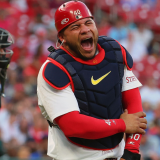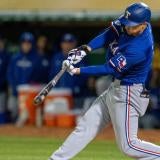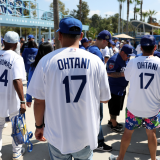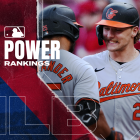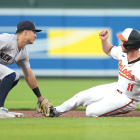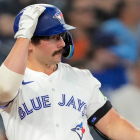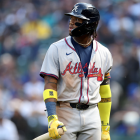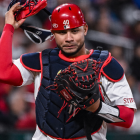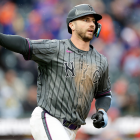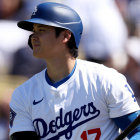Danny Farquhar is accustomed to being an exception. He is, at 5-foot-9 officially, among the shortest pitchers to compile significant big-league innings since the last wave of expansion. His high-spin "carry fastball" enables him to pitch up in the strike zone more frequently than most pitchers with his plane and velocity would dare. But when Farquhar takes the mound for his spring debut, his presence will be conspicuous for a different reason than those: It'll mark his first appearance since he almost died.
On April 20, 2018, Farquhar collapsed after returning to the dugout following his outing.Then a member of the Chicago White Sox, he was taken to nearby Rush University Medical Center where he spent the next 18 days in the intensive care unit. He had suffered a ruptured brain aneurysm, a condition with a 40 percent fatality rate that imprints a permanent neurological disorder in nearly 70 percent of its survivors, according to the Brain Aneurysm Foundation.
Farquhar, fortunately, escaped with his life and without lasting damage. He resumed normal household tasks -- washing the dishes, doing the laundry -- within days of being discharged. Nearly 10 months later, and thanks to the support of his wife (with whom he has three kids) and their families, he's back to where he was physically -- a process that required him to rebuild his strength. "We had to start from square one -- band work, balance … I didn't touch a weight for a couple weeks," he told CBS Sports. "The first weights were very, very light and it was shocking."
If Farquhar has his way, his return to normalcy will include a spot on a big-league roster. He recently signed a minor-league pact with the New York Yankees after being cleared following an array of team-ordered tests and doctor appointments. His own rotation of white coats had cleared him in November, months after he was convinced to postpone his initial comeback target of September. The Yankees bullpen would seem to be a tough unit to crack. They ranked fourth last season in ERA, and have since signed prized free agent Adam Ottavino and retained former All-Star closer Zach Britton. Add in guaranteed spots for Aroldis Chapman, Chad Green, and Dellin Betances; Jonathan Holder's impressive 2018; and Luis Cessa and Tommy Kahnle's lack of options, and barring an unforeseen development there might not be a space available for Farquhar at the season's onset.
Still, Farquhar should find himself in the majors at some point in 2019, it will be a shocking development to most everyone but him. "There was never a doubt in my mind that I was going to be back," he said. "Maybe I'm just naive, but I never had a doubt."
Don't mistake the eventual Farquhar promotion as a charity case or some cheap publicity stunt, either. Over the last three years, he's proved to be an effective middle reliever by posting a 108 ERA+ and 2.33 strikeout-to-walk ratio in 92 innings. His 24.9 strikeout percentage during that time span rivals those of Kelvin Herrera, Addison Reed, and Brandon Morrow -- relievers who signed multiyear deals the past two winters. He has reason to believe his fastball could play beyond his typical 93 miles per hour, too.
Farquhar's Instagram houses numerous videos of him using a device called the zPocket Radar Ball Coach -- an instrument he was first introduced to by one of the trainers at his gym. He's flirted with Kopechian velocity using a lighter ball, and in August he set a new personal record for offseason training by hitting 90 mph. "My high in prior offseasons was 88 miles per hour," he said. "On a turf mound, without a batter in there, it's tough to get pumped up, it's tough to get the adrenaline going."
Whether or not Farquhar's velocity gains prove sustainable, he should come out of the bullpen with enhanced power of another sort.
Farquhar received myriad letters and messages from fans during his recovery, a development that revealed to him the inspirational value his story held for others, including those fighting their own health battles. He speaks in an easy, cheerful tone -- the kind associated with one who either has or has never came in close contact with death, depending on the perspective -- and offers a zen-like response when asked what's the biggest lesson he's learned: "Try to live as stress-free of a life as you can possibly can," he said, "in three days you won't even remember the little things, so why get upset over them?"







